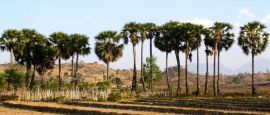East Timor: Doing business & staying in touch
Doing business in East Timor
Subsistence agriculture, forestry and fishing sustain most of the population. The sole export products are coffee beans, timber and sandalwood.
The economy as a whole was chronically underdeveloped as a result of centuries of neglect by the Portuguese. The Indonesians built some basic infrastructure (roads, power, telecommunications), but most of that was destroyed or removed by the Indonesians themselves and their client militias in the aftermath of the August 1999 vote for independence.
Since then, East Timor's principal source of income has been international aid. However, the country's originally poor economic prospects have been transformed by the discovery of large oil and gas fields in the Timor Sea, which lies between Timor itself and the north coast of Australia.
East Timor remains one of the region's poorest nations, with a per capita annual income estimated at between US$200 and US$500.
Keeping in Touch in East Timor
Coverage provided by Timor Telecom International in and around Dili and other main urban areas. International roaming agreements are stilll being set up but cannot be relied upon as yet. In some parts of the country, however, telephone communication may still only be possible with satellite telephones.
Facilities are not generally available to the public at the present time but VPM Internet Services (website: www.vpm.com) does operate in the country.
East Timor's national public radio and TV services began broadcasting in May 2002 when the country gained independence, replacing the interim broadcasting services operated by the UN. Public radio services are said to reach some 90% of the population; public TV has a smaller coverage. Community radio stations have played a key role in the process of national reconstruction. Many of the stations receive funding, training and equipment from international agencies and organisations.
• East Timor has two daily newspapers, Suara Timor Lorosae and the Timor Post.
• A number of weekly titles include Jornal Nacional Semanario.
• Radio Nacional de Timor Leste (RTL) is public.
• Radio Falintil/Voz da Esperança is a community station which began life as a clandestine station operated by East Timor rebels.
• Radio Timor Kmanek (RTK) is a Catholic Church radio.
• BBC World Service programmes in English and Portuguese are available in Dili on FM frequencies.








 You know where
You know where